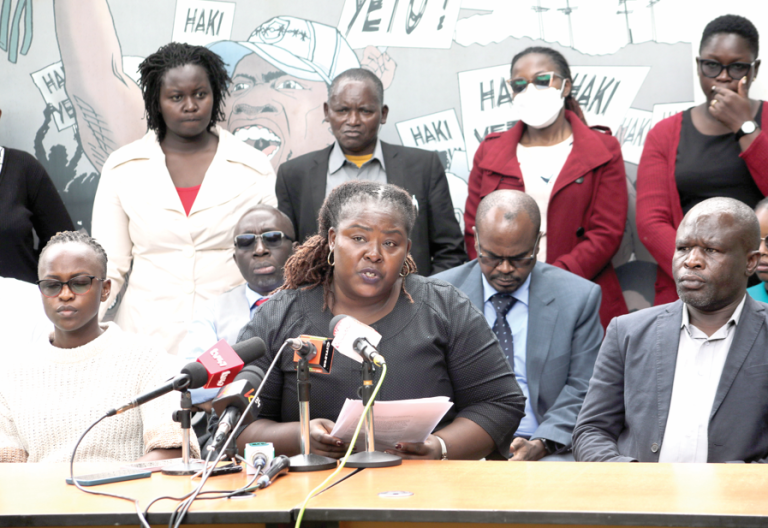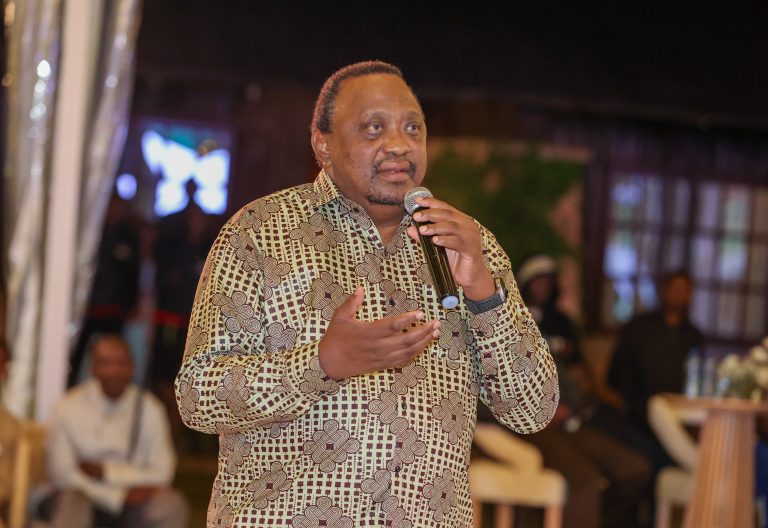Civil society gives damning mid-term report on Ruto’s reign

Civil society organisations have issued a damning mid-term assessment of President William Ruto’s administration, painting a bleak picture of deteriorating governance, rampant human rights violations, economic despair and systemic repression.
In a joint statement, the organisations laid bare crises affecting the country across sectors, from police brutality and political violence to economic mismanagement and collapse of social services.
The report was unveiled during a press briefing convened in Nairobi by a coalition of human rights defenders, legal experts, and policy advocates from various civic groups.
“This is a state of national despair. We are witnessing a regime that is systematically dismantling democratic governance and civic freedoms,” said Davis Malombe of the Kenya Human Rights Commission, introducing the statement.
Speakers at the function highlighted how civil liberties have shrunk under the current administration, with CIVICUS, an international civil society monitor, downgrading Kenya’s civic space status from obstructed to repressed in 2024.
“Citizens are dying in hospitals, students are stranded in universities, and the youth face police crackdowns for merely expressing dissent,” said Malombe, citing government failures in healthcare, education, and public participation.
He also painted a harrowing picture of state violence. Between January and September 2023, the Independent Medico-Legal Unit documented 228 cases of police torture and 67 extrajudicial killings. The Kenya National Commission on Human Rights recorded 63 deaths and over 600 injuries during Gen Z protests last year.
“The State has abandoned the rule of law. Disappearances, abductions, and violent arrests have become normalised,” Malombe said,
He also noted that up to now at least 26 Kenyans remain missing, allegedly abducted by security forces including the DCI, Anti-Terror Police Unit, and National Intelligence Service.
They demanded urgent, impartial investigation into all cases of enforced disappearances, police killings, and abductions of protesters and critics of the regime.
“Those found culpable, including high-level command, must be held accountable for their crimes. This regime must immediately cease the politicisation of security agencies and disband elite police units involved in unlawful operations,” he demanded.
Nerima Wako from Siasa Place stated that there is an alarming rise in political intolerance, gang violence and gender-based attacks.
“In 2024 alone, 579 femicide cases were recorded. This means that more than 30 women are killed every month. This is a direct consequence of state failure to protect women,” she stated.
The National Police Service and National Crime Research Centre report released on April 9, 2025, showed that between January and March this year, 129 women were murdered.
Wako described how rogue political elements disrupted peaceful meetings and protests, especially those critical of the government, highlighting incidents in Limuru and Nairobi that turned deadly during President Ruto’s tour.
KHRC demanded that femicide be included as a distinct offence under the Penal Code.
Cornelius Oduor from the Kenya Human Rights Commission spoke on the deterioration of public education and health services.
“Universities are collapsing, funding is chaotic, and the new university model has been declared unconstitutional yet the government insists on implementing it.”
Oduor also said that the health sector is no better saying that the transition from NHIF to the Social Health Authority (SHA) has left patients stranded, providers unpaid, and the system in chaos.
He demanded that the government must establish a comprehensive national education support fund to ensure no child is left behind, especially those from low-income families, marginalised communities, and persons with disabilities.
The coalition said that the government had failed to guarantee its citizens the right to housing.
“Under the guise of affordable housing, homes have been demolished without adequate compensation or resettlement.” The proposed amendment to reduce foreclosure notice periods has particularly alarmed activists, who argue that it threatens the very people these housing projects purport to help.
Catherine Mbui of Article 19 Eastern African criticised the state’s increasing hostility towards civil society organisations and the media. Over 2,800 public benefit organisations were deregistered in 2024, and several legal reforms are under way that may further curtail freedoms.
“There have been physical attacks on journalists, cancellation of government advertising to independent media houses, and new laws that extend digital surveillance. This is a systematic erosion of free expression,” she said.
Transparency International-Kenya Executive Director Sheila Masinde described Kenya’s financial landscape as a classic case of state capture.
“The presidency and Treasury have been turned into instruments of elite plunder. Public debt continues to balloon with little to show for it. Corruption is choking the nation,” Masinde said.
She emphasised that without transparency, accountability, and a genuine crackdown on graft, Kenya risks economic collapse.
The coalition is urging the government to respect human rights, restore civic space, and uphold constitutional governance. They also called for investigations into enforced disappearances, extrajudicial killings, misuse of public funds, and politically motivated violence.











